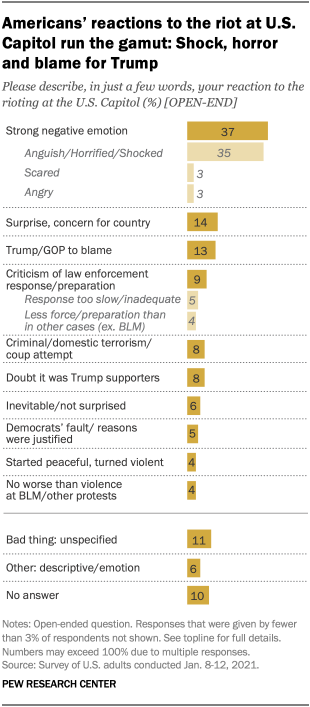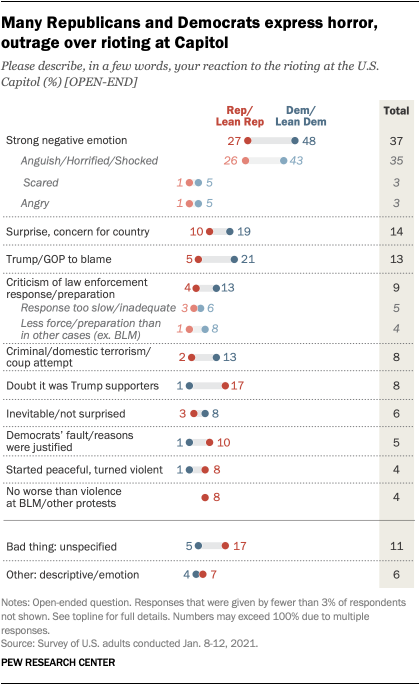As a mob of President Donald Trump’s supporters rampaged through the U.S. Capitol on Jan. 6, many Americans were filled with shock, horror and anguish.
Their responses to the Capitol riot were, in many cases, raw and emotional, according to a Pew Research Center analysis of open-ended survey responses collected from Jan. 8 to 12.
“Saddened, hurt, disgusted,” one woman in her 50s said. “Never thought I would see anything like this in my life.”
Shock and concern for the country came up frequently in Americans’ responses, but their reactions ran the gamut – from horror and blame on Trump to a relatively small number who either sought to justify the violence or falsely said it was not perpetrated by Trump supporters.
Pew Research Center conducted this study to examine the public’s reactions to the U.S. Capitol riots earlier this month. For this analysis, we surveyed 5,360 U.S. adults in January 2021 and coded 2,684 open-ended responses about the event. Everyone who took part in this survey is a member of Pew Research Center’s American Trends Panel (ATP), an online survey panel that is recruited through national, random sampling of residential addresses. This way nearly all U.S. adults have a chance of selection. The survey is weighted to be representative of the U.S. adult population by gender, race, ethnicity, partisan affiliation, education and other categories. Read more about the ATP’s methodology.
Here are the questions used for this report, along with responses, and its methodology.
The new survey, conducted among 5,360 U.S. adults, included an open-ended question asking people to share their reaction to the rioting at the U.S. Capitol. The responses of a random half of respondents (2,684 adults) were analyzed. Many responses touched on multiple topics, and the categories listed in this analysis are necessarily approximations.
Nearly four-in-ten adults (37%) expressed a strong negative emotion in response to the riot. A woman in her 60s said, “Shocked, horrified and sad for our country. We were there a few years ago and were awestruck. How could fellow citizens violently enter federal buildings intending to destroy property and possibly harm our leaders?”
More than one-in-ten Americans (14%) also expressed surprise, incredulity or embarrassment that such an event could happen in the United States. One man in his 60s said, “A slap in the face to democracy, something you would expect to see in a third world nation.”
A much smaller share of adults (6%) said they were not surprised by the events that occurred at the Capitol. As one woman in her 30s put it, “Disappointed, not surprised. This felt inevitable given the rhetoric of the last four years and especially the last two months.”
A sizable share of Americans (13%) blamed Trump or Republican leaders for the event – with the overwhelming share these of adults specifically naming Trump.
About one-in-ten respondents (9%) expressed concern about law enforcement’s preparation and response when dealing with the riot. That included 5% of adults who said police were underprepared or too slow in responding to events, while 4% of adults said they felt that law enforcement’s response to the riot was much less forceful than how police had responded to Black Lives Matter demonstrations in 2020.
Black adults were particularly likely to highlight differences in law enforcement response: 15% said something to this effect, compared with just 2% of White adults. One Black woman in her 60s said, “Unbelievable, unfortunate, ridiculous, shameful. What could they possibly accomplish? If it were Black or Brown people they would have had more deaths. Without a doubt!!!!”
Nearly one-in-ten adults (8%) described the rioting as an act of domestic terrorism, sedition or an attempted coup or called for the perpetrators to face severe criminal penalties. One man in his 70s said, “Disgust. All involved, including Trump, should be charged with treason and sedition.”
Roughly the same share (8%) expressed doubt about whether the rioters were Trump supporters, including some who named Antifa or Black Lives Matter as the perpetrators.
A small share (4%) said they thought the events had been mostly peaceful – and that a relatively small number of individuals instigated the destruction. One woman in her 30s said, “I believe that most of the assembly was peaceful. I believe a few individuals were attempting to cause chaos and rioting to make Trump supporters look bad.”
While many Americans acknowledged that the violence was uncalled for, 5% also expressed frustration and sympathy for what some of the participants may have been feeling. One woman in her 60s said, “I will not say that it was right but I can understand it. The election was a joke and the American people are fed up with the way the Democrats have treated the Republicans.”
A small share of adults (4%) characterized the events that unfolded at the Capitol as no worse than – or not as bad as – other protests and demonstrations. One woman in her 60s said, “this was no different than the protests and riots that occurred after the racial unrest. I don’t like any of it.”
Partisan differences in reactions
While Republicans and Democrats expressed some of the same reactions to the riot, there were some notable differences – especially around the cause of the violence and destruction.
Around half of Democrats and Democratic-leaning independents (48%) expressed a negative emotion like disappointment, disbelief or fear in response to the attacks. This is also the most common response among Republicans and Republican leaners, though it was expressed by a smaller share (27%).
Notably, about two-in-ten Democrats (21%) specifically called out Trump and/or Republicans for inciting violence. A similar share (19%) said they were surprised to see something like this happen in their country. About 10% of Republicans expressed surprise, while 5% pointed blame at Trump or the GOP.
Democrats were also particularly likely to point to failures of law enforcement – either in their lack of preparation or how they treated the rioters – as part of their negative reaction to the event. That included 8% who made note of the contrast between the treatment of the largely White group of rioters when and the treatment of Black Lives Matter protestors or other groups; 6% said the police response to the attack was too slow or that they were inadequately prepared.
About one-in-ten Democrats (13%) characterized the event as a crime, a coup attempt or domestic terrorism or otherwise called for those involved in the destruction to be punished. Nearly one-in-ten Democrats (8%) said the riot was inevitable or expected, with some of these pointing to Trump’s rhetoric around the 2020 presidential election as a catalyst for the events.
Republicans were more likely to express doubts about who was behind the violence and destruction: 17% said that the destruction hadn’t been instigated by Trump supporters, but rather was done by Antifa, Black Lives Matter or other groups.
Republicans were also particularly likely to say they understood the frustrations of those who participated in the Jan. 6 event (10%) or that the day started peacefully or was primarily peaceful (8%). And nearly one-in-ten (8%) pointed to protests and demonstrations by Black Lives Matter or other groups last year, saying that the events that occurred on Jan. 6 were no worse or not as bad.
While 5% of Republicans asserted that Trump and other members of the Republican Party were at fault, a similar share of Republicans said explicitly that Trump was not responsible (4%).
In many cases, the same individual expressed a number of these views. For example, one Republican man said, “Shameful. Baffling that the cops were not prepared. Too much violence in the name of protests has been tolerated all through the year (BLM, Antifa, Proud Boys) leading to protestors getting emboldened that they could get away with this.”
Note: Here are the questions used for this report, along with responses, and its methodology.





